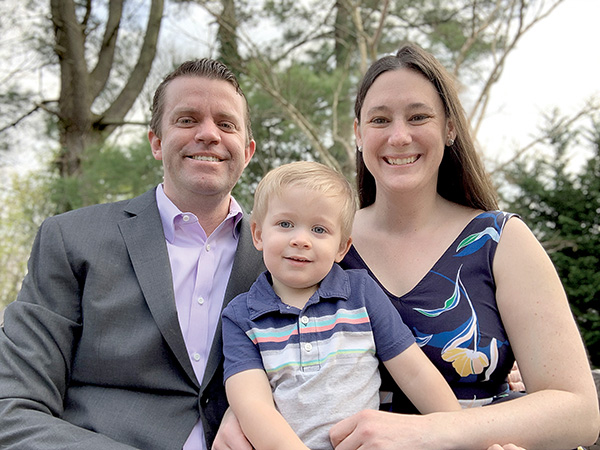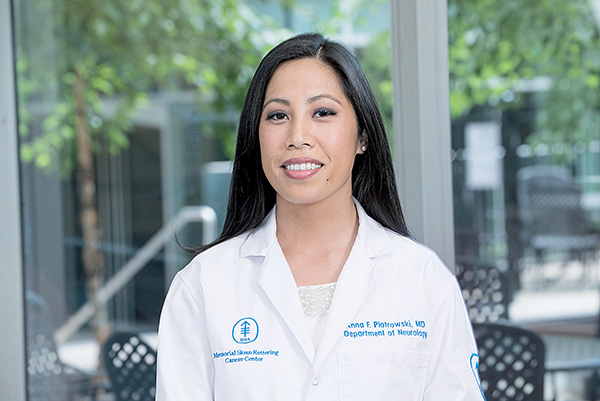
By Jamie Jablonowski, MPH, BSN, RN
Jeremy Duder smiles wide, pointing to photos of Italy and Costa Rica on display in his Matawan home as he watches his wife talk about the places they have seen throughout the years. The couple has traveled the world together, but recently found themselves on a new journey when Jeremy was diagnosed with a rare brain tumor.
Jeremy has a genetic disease called neurofibromatosis type one (NF1) that causes tumors to grow along his nerves. In most cases, these tumors are noncancerous. NF1 is a rare disease, affecting 1 in 2,500 to 3,000 births, according to the National Organization for Rare Disorders. About half of the people with NF1 inherited the disease from one of their parents. The other half of patients will be the first in their families to present with NF1. Duder’s mother and sister also live with this disease and Duder was diagnosed as a toddler. He recounted the frequent doctors’ appointments needed for monitoring and also struggling with reading throughout his life as learning disorders are also common in patients with NF1.
NF1 is commonly diagnosed in young children when they present to their pediatrician with café-au-lait spots, which are flat, light brown spots on the skin. Anna Piotrowski, M.D., is a neuro-oncologist at Memorial Sloan-Kettering (MSK) in Middletown and leads a specialized team of experts that cares for patients with NF1-associated tumors.
“There’s a wide spectrum,” she explained. “There are some patients who have minor symptoms and a very normal life, and there are patients who have a disabling disease based on the location and severity of their tumors.”
Around 2005, Duder started to experience facial pain that came and went. Reluctantly, he went to the doctor and received an MRI that showed lesions on his brain, which was seen as suggestive of multiple sclerosis (MS). Megan Paulus, Jeremy’s wife, reflected, “The interesting thing is that they thought it was something else when now we know that that’s what an NF brain can look like.” For years, he was watched for more MS symptoms.
It was during this period when Duder met Paulus in New York, a few weeks before she planned to move to Philadelphia to attend graduate school. She moved, but they didn’t remain apart for long. Paulus eventually returned to New York, where the two married before moving to Matawan to start a family. They had a son and, shortly after that, Duder started to show new symptoms.
It began with lightheadedness and vision issues. He presented to his doctor, who confirmed it wasn’t related to MS, leaving Duder assuming it was maybe related to his glasses, which he promptly replaced. The couple also thought a recent promotion coupled with the stressors of being a new father might be contributing. Yet Duder continued to experience intense fatigue and eventually developed trouble swallowing and altered taste.
The couple saw a series of doctors before finally returning to the MS doctor, who prescribed another MRI. Paulus described the terrifying moment of walking into the doctor’s office to review the results. “We were walking into the office expecting a multiple sclerosis diagnosis, which is not great news, but we had spent a couple of days gearing up to hear that.”
The couple said their life changed once they walked out of that room. The doctor informed Duder he had a tumor on his brain stem caused by NF1 and affecting less than one percent of patients with the disease. He then referred them to MSK for treatment. Eventually, they found Piotrowski. Duder took five months off work and began a journey of oral and intravenous chemotherapy, radiation, doctor’s visits and blood work. The couple described it as a storm.

“Sometimes, I think we are the luckiest, unluckiest people in the world. In some ways, we are profoundly unlucky, but in what has happened since, we’ve had some profoundly good luck,” said Paulus as her husband shook his head in agreement. They are grateful Piotrowski’s office is only 15 minutes from their house and for the support they received from friends and family. They recall Duder’s sister traveling in multiple times from Anchorage, Alaska, to help; friends who shaved their heads in solidarity when it was time for Duder to shave his; and the friends who would provide a bit of normal conversation during difficult times as a distraction from the challenges the couple faced at home.
All this, while the pandemic raged on.
Duder is now doing very well on a new, targeted drug therapy. He wants to ensure that people are aware of both the disorder and the complications that can arise. Because he was initially misdiagnosed, his wife echoes this sentiment and stated that it’s essential to ask questions and get second opinions if needed.
Piotrowski reflected that she appreciates when patients write their questions down and would like to hear about all symptoms, big or small. She reminds patients to call with any concerns as there is a team of providers readily available to assist. Patients currently travel from all over the world to come to the NF clinic at MSK where they have the opportunity to see multiple members of the team during a single visit. She highlights the close collaboration among the researchers in her field and is optimistic that new treatments are on the horizon.
When asked about the career path she has dedicated her life to, Piotrowski said, “I think the best part is being inspired by my patients and seeing how their priorities change when their health becomes an issue. Most people like Megan and Jeremy are just approaching mid-life and starting a family and did not expect to be dealing with chemotherapy, radiation, IV infusions and regular bloodwork. The best thing is really how much I learn from them and how inspiring they are. Not just Jeremy himself for being so courageous, but Megan for supporting him.” Duder continues his care with Piotrowski and her team.
Near the end of the interview, a troubled 4-year-old with an iPad interrupts the couple. Paulus patiently helps him reach the next level of his game while Duder watches them both, still smiling.
The article originally appeared in the July 1 – 7, 2021 print edition of The Two River Times.














